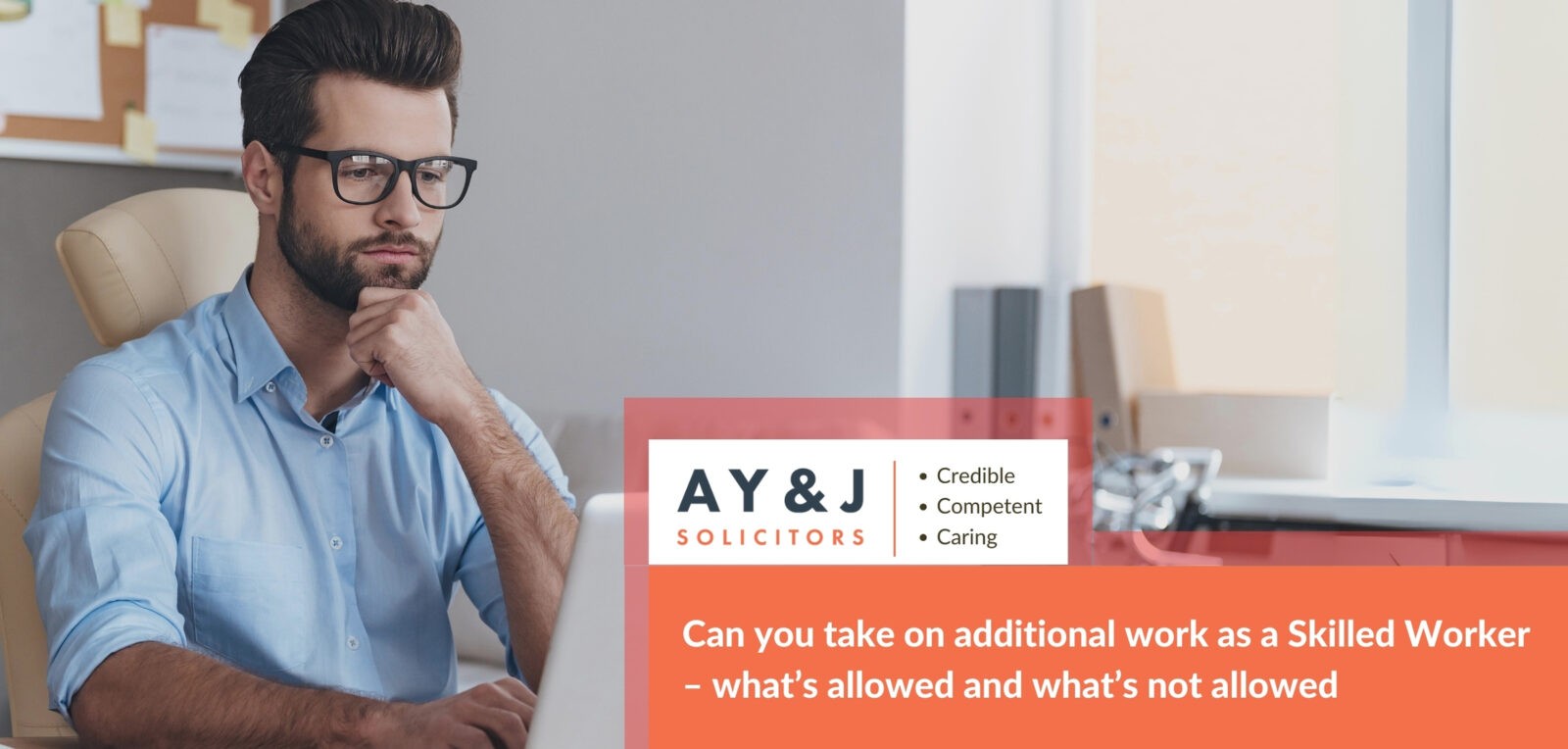Disclaimer: The information in this blog is accurate as of its publication date. Any updates after that date are not reflected here.
If you hold a Skilled Worker visa, you can boost your income or give back to the community, but only within strict Home Office limits. Understanding the rules for Skilled Worker visa additional work is essential for maintaining your legal status. These rules sit within the UK’s points-based immigration system under Appendix Skilled Worker.
Key Rules for Additional Work:
- Supplementary Employment: From 22 July 2025, supplementary employment for a Skilled Worker can be up to 20 hours a week in another job or their own business outside their sponsored hours, if the work is in a higher-skilled eligible occupation code, on the Immigration Salary List, or in the same sector and level as their main job. You can take ‘medium-skilled’ supplementary work only if you were first sponsored before 22 July 2025 and have held continuous permission since that date.
- Overtime for Your Sponsor: Overtime is unlimited and does not count towards the 20-hour limit as long as the duties stay within the role described on your Certificate of Sponsorship.
- Voluntary Work: Genuine voluntary work is allowed if it remains unpaid (only reasonable expenses like travel can be reimbursed) and does not interfere with your sponsored job.
- Secondary Employment: Any extra work over 20 hours a week, in a different occupation code or with a new sponsor, means you need to update your visa. Ask the second employer for a new Certificate of Sponsorship and send a short covering letter to the Home Office.
Why the Rules Matter in 2025
Skilled Worker visa conditions are not polite suggestions. They are legal limits backed by escalating sanctions that can end a career and cripple an organisation. The Home Office actively enforces these conditions, issuing thousands of civil penalties each year for visa breaches. Most fines still come from working more than 20 extra hours or taking a role outside the approved occupation code.
For the worker:
Breach your visa and UKVI can curtail your leave within days. You will normally receive 60 days to leave the UK or apply for a new visa, and the breach is recorded for ten years. Future applications, including settlement, can be refused even if the extra work was only a few hours and your sponsor encouraged it.
For the sponsor:
If UKVI decides you knew or should have known about the breach, your licence can be downgraded, suspended or revoked. Downgrading forces a £1,476 action plan and stops you issuing new Certificates of Sponsorship until you regain A-rating. Revocation ends every sponsored worker’s visa instantly and bars you from reapplying for twelve months. Civil penalties now start at £45,000 per illegal worker for a first offence and rise to £60,000 for repeat breaches. Criminal prosecution, carrying up to five years’ imprisonment, is pursued where employers deliberately ignore the rules.
For both parties:
Reputational damage is permanent. The Home Office publishes non-compliant sponsors on a public register, and even a suspended licence appears on the list. Candidates, investors and insurers routinely check the register before signing contracts.
Staying within the supplementary-work limits is therefore the cheapest insurance you will ever buy.
Skilled Worker Visa Additional Work Rules (2025 Update)
Skilled worker visa holders have conditions imposed on their visa. Although they are free to travel in and out of the UK, there are few restrictions on their employment.
It is important to understand the rules on work conditions as a breach of the conditions could lead to curtailment of the visa. This means that your visa length would be cut short (cancelled). A breach of conditions could also severely affect any future visa application as it would be on your immigration record.
What are Skilled Workers Allowed to Do?
In order to maintain the skilled worker visa, holders must satisfy all the visa conditions.
Skilled Workers are allowed to:
- work in an eligible job
- study
- take on additional work on a Skilled Worker visa in certain limited circumstances
- do voluntary work
- travel abroad and return to the UK
- bring dependants (partner and children) who can work without needing their own sponsorship
- buy residential or commercial property in the UK
- apply to settle permanently in the UK (also known as ‘indefinite leave to remain’)
Can Skilled Worker dependent work in the UK?
Your partner and children can apply to join you. Once here, they can work in almost any job including self employment and they can also study. Many people ask can a Skilled Worker dependent work in the UK, and the answer is yes—dependants have significant freedom in their employment options.
Can Skilled Workers buy property in the UK?
There is no immigration rule that stops you buying a home or investment property. Banks will check your income and visa length before offering a mortgage, but your Skilled Worker status itself is not a barrier.
Eligibility for Indefinite Leave to Remain
You only become eligible for indefinite leave to remain after completing a continuous period of 5 years under the route. You also must meet all other eligibility requirements. Build your timeline for a Skilled Worker visa extension and map the route to Settlement as a Skilled Worker.
It is important to note that Skilled Workers must work for their sponsor in the sponsored role. Generally, the Home Office allows you to work outside the sponsored employment. However, there are limited circumstances when you are working outside the sponsored role. The Home Office refers to these as ‘supplementary employment for Skilled Worker’ or ‘secondary employment under Skilled Worker visa’.

Supplementary Employment
In addition to the job specified on the certificate of sponsorship (CoS), a Skilled Worker’s conditions allow them to do additional work if all of the following apply. This answers a frequent query: Can I work 20 hours extra on a Skilled Worker visa?
Checklist of key requirements:
- Up to 20 hours per week outside the hours of your main job
- The role must meet a sponsorable occupation code from Appendix Shortage Occupation List (after 4 April 2024 this may be different from your main role’s SOC)
- You must still be working for your main sponsor under your CoS while doing the supplementary work
- The employer of the supplementary job does not need to be a licensed sponsor.
Example Scenario: A nurse can pick up weekend bank shifts within the 20-hour limit; an IT worker can code after hours for another firm in the same occupation code.
If the work meets the above requirements, you do not need to inform the Home Office that you are doing additional work on a Skilled Worker visa. The Home Office permits this within the standard conditions of the Skilled Worker visa.
It’s important to note that you can only take supplementary employment if you continue to work for your sponsor. If you have left your sponsored employment, it does not give you permission to carry out supplementary Skilled Worker visa working hours of 20 hours a week.
Note: Skilled Worker visa salary and skills thresholds are increasing, and some roles appear on the Immigration Salary List (ISL).”
Secondary Employment
Skilled Worker visa holders can apply to the Home Office to take on an additional work on a Skilled Worker visa second job for more than 20 hours a week and a job that is not on the Shortage Occupation List or in the same occupation code as their sponsored role. This is known as secondary employment under Skilled Worker visa.
How to Proceed:
- Get a new Certificate of Sponsorship (CoS) issued by your second employer who must hold a sponsor licence
- Submit a visa variation or update application to the Home Office to include both jobs on your permission to stay. Include the new CoS and a cover letter explaining you are taking on the second job on a Skilled Worker visa.
- This is essential if you’re working more than 20 hours on a Tier 2 visa (now Skilled Worker) in a second job.
- Once approved, you’ll receive updated permission showing both roles on your BRP or eVisa, including any restricted work on BRP under Skilled Worker visa notes.
Note: Check whether you need a Defined Certificate of Sponsorship (DCoS) and understand Defined CoS and an Undefined CoS before applying.
Key Clarification:
The existing conditions do not cover working in a second job on a Skilled Worker visa. This means working more than 20 hours on a Tier 2 visa therefore, needs a variation application. must apply for a variation of permission. You must first have your second-job sponsor assign you another CoS. You can use this CoS to make a variation application. Then you will have two sponsors, and the Home Office will issue you a new BRP that specifies this. It is not possible to apply for further permission to stay for the second job until you have started working for your first sponsor.
Eligibility for Secondary Employment
The current sponsored job and the secondary job must both meet the eligibility requirements of the Skilled Worker route. This includes meeting the minimum skill level and salary requirement or the going rate for the relevant occupation code.
Please note that taking on additional work may be subject to your employment contract with your main sponsor. It is common practice that employers do not generally allow employees to work elsewhere during their period of employment. Before pursuing a Skilled Worker visa second job, make sure to read your employment contract carefully.
Main Job vs Secondary Job Eligibility
| Aspect | Main Job | Secondary Job |
| Eligible occupation code | Must be eligible under the Skilled Worker route | The role must be on the list of sponsorable occupations or qualify under the supplementary employment for Skilled Worker rules. |
| Salary / going rate | You must earn at least £41 700 a year or the job’s higher going rate for applications made from 22 July 2025. | The job must also pay at least the minimum salary or the going rate set for that occupation. Understanding Skilled Worker visa minimum working hours and salary thresholds is essential for compliance. |
| Contractual restrictions | Your employment contract may require exclusivity or restrict external work | Check that your contract permits a Skilled Worker visa second job and that the new role will not interfere with your main duties. |
Make sure both roles meet Skilled Worker rules and that your contract allows the extra job before you proceed.
Exceptions for Health and Care Worker visa – Do They Still Apply?
Skilled Workers whose occupation code qualifies for the Health and Care Worker visa previously enjoyed a temporary allowance to undertake unlimited additional work in another eligible health and care role. That concession closed on 27 August 2023, and Health and Care Workers are now bound by the standard supplementary employment rules.
On this date, this exception for Health and Care supplementary employment conditions was terminated. So that means the exception no longer applies after that date.
It is important for employers to be aware of the change to this concession. Any employer found to be employing someone who is in breach of their visa conditions could face a hefty civil penalty under the illegal working legislation. However, if they have statutory protection (records of a valid right to work check), it can be an exception.
Working Overtime for Your Sponsor
Here is how overtime differs from supplementary work:
| Overtime | Supplementary work |
| Unlimited hours | 20 hours max each week |
| No visa update required | Must meet same SOC code or shortage role |
| Must stay with the same sponsor company | No visa update required |
There is no Skilled Worker visa minimum working hours rule set by UKVI. Overtime is lawful only when the extra hours are logged with the sponsor named on your CoS and the duties remain within the role described on that CoS. If you pick up shifts or projects with any other employer, even occasionally, those hours fall under supplementary employment for Skilled Worker or secondary employment under Skilled Worker visa rules.
There are no restrictions on working overtime for your sponsor in your sponsored role. There is no limit on the hours of overtime work and the Home Office does not need to be notified if you work overtime for your sponsor (provided you are paid for overtime in line with sponsorship requirements).
What Happens If I Work More Than 20 Hours in the UK?
If you are working more than 20 hours on a Tier 2 visa (Skilled Worker) without updating the visa, you will breach your conditions. Consequently, the Home Office may curtail or cancel your leave. Furthermore, you risk deportation, a ban on re-entry, and damage to future visa applications. Understanding the implications of working more than 20 hours on a Tier 2 visa is crucial to maintaining your legal status in the UK. Always seek explicit lawful permission before taking any extra hours.
Worker penalties
- Curtailment: UKVI can cut your visa to 60 days, forcing you to leave or reapply.
- Deportation: if over-work is judged deliberate, you can be removed immediately and face a one-year re-entry ban for a first offence, ten-year ban for deception or repeat breaches .
- Future refusal: any breach stays on your immigration record for ten years and can ground a refusal of settlement or even a visitor visa.
Employer penalties
- Civil penalty: up to £45,000 per illegal worker for a first offence, rising to £60,000 for repeat breaches.
- Sponsor-licence action: suspension or revocation, ending every sponsored worker’s visa overnight.
Can I Do Freelance Work on Skilled Worker Visa UK?
You can treat freelancing on a UK Skilled Worker visa as “additional work or a second job”. However, you may only do up to 20 hours a week in that role if it uses the same occupation code as your sponsored job or appears on the Shortage Occupation List—and only outside your main hours. The Skilled Worker visa working hours restrictions also apply to any freelance activities you undertake. The Skilled Worker visa does not generally permit Skilled Worker self-employment. Any freelance activity must still meet the supplementary employment rules. Always check your occupation code and employer contract before starting any self-employed work.
Can I Earn from Social Media or a Side Hustle?
You can accept payment only if the activity sits in the same SOC 2020 code or a shortage role, and the hours stay within the 20-hour weekly cap. Otherwise, the income is unlawful and breaches your visa. This is particularly important to understand when considering Skilled Worker self-employment opportunities or side income streams.
Voluntary Work
Skilled Worker visa holders can take on additional voluntary work in their free time. There are no limitations on the job role or sector of the voluntary job. However, the voluntary role must not affect your ability to carry out your sponsored employment. As the role must strictly be voluntary, you must not receive any form of payment for this job. However, they do allow reimbursement for your expenses but not for wages.
Example 1
An IT company sponsored you as an IT Manager under standard occupation code 2133. Your normal working pattern as per your CoS is Monday to Friday 9am to 5pm. You are intending to take on an additional part-time role as an IT Manager for another employer on Saturdays for 8 hours per week.
Since the additional role falls under the same occupation code as your main job, involves fewer than 20 hours per week, and takes place outside your normal working hours, the Home Office allows you to take on that role under your Skilled Worker visa conditions. This is a common question: can I do another job on a Skilled Worker visa? You do not need to inform the Home Office and are free to take on the additional work as it is within your visa conditions.
Example 2
A retail business sponsored you as a Sales Supervisor under standard occupation code 7130. Your normal working pattern is 10am to 6pm every weekday. You want to take on additional work in the evenings for a coffee shop as a Barista.
The Home Office does not permit this under the Skilled Worker conditions. The additional role as a Barista is not in the same occupation code as your sponsored role, nor is it in the shortage occupation list. Although the role would be outside the working hours of your sponsored job, you must meet all three conditions of the supplementary employment to be able to take it on without breaching the conditions of your visa. This scenario illustrates why understanding the limitations is crucial when asking can I do another job on a Skilled Worker visa.
Example 3
You are sponsored as a nurse under code 2231 and want to volunteer at a local charity hospital at weekends. This is allowed provided the work is unpaid, only out-of-pocket expenses such as travel are reimbursed, and the volunteering does not clash with the hours or duties of your main job.
Example 4
You hold a sponsorship as a software developer under code 2136 and would like to spend your free time mentoring at a community coding club. You may do so if the role is unpaid, only out-of-pocket expenses are refunded, and the volunteering never overlaps with the hours or duties of your sponsored job.
Example 5
You are sponsored as a healthcare assistant under code 6145 and want to volunteer at an NHS trust on your days off. This is fine provided the work is unpaid, only travel or meal costs are refunded, and the volunteering does not clash with your contracted hours or responsibilities.
How We Can Help
The team at A Y & J Solicitors are experienced in dealing with Skilled Worker visas, including matters related to Skilled Worker visa additional work. Whether you have questions about a Skilled Worker visa second job or need guidance on Skilled Worker additional work compliance, we can provide expert advice tailored to your circumstances. If you have queries relating to your conditions or would like advice about your specific circumstances, please do not hesitate to get in touch with us.
At A Y & J Solicitors, we have handled over 100s of successful Skilled Worker visa applications. With a 95% success rate, we have achieved an overall track record of 5,000+ successful immigration and visa cases through our result-driven approach to every application. We take on each client with the genuine intention to provide our undivided care and attention to their case. We guide you through every step of your Skilled Worker visa process, so you can trust the experts to manage your application and work toward your success.
Why A Y & J Solicitors?
With over thousands of successful immigration cases to our name, A Y & J Solicitors has built its reputation on trust, care, and real results. Over the 15+ years of working in UK immigration law, we’ve helped individuals and businesses confidently navigate sponsor licences, UK visas, and ILR applications. We’re proud to be recognised by The Legal 500, but it’s our clients’ peace of mind that matters most. When you work with us, you get clear advice, honest support, and a team that’s truly on your side.
A Y & J Solicitors is a specialist immigration law firm with extensive experience in Skilled Worker visas and immigration compliance. We have an in-depth understanding of immigration law and are professional and results-focused. For assistance with your visa application or any other UK immigration law concerns, please contact us on +44 20 7404 7933 or contact us today. We’re here to help!








